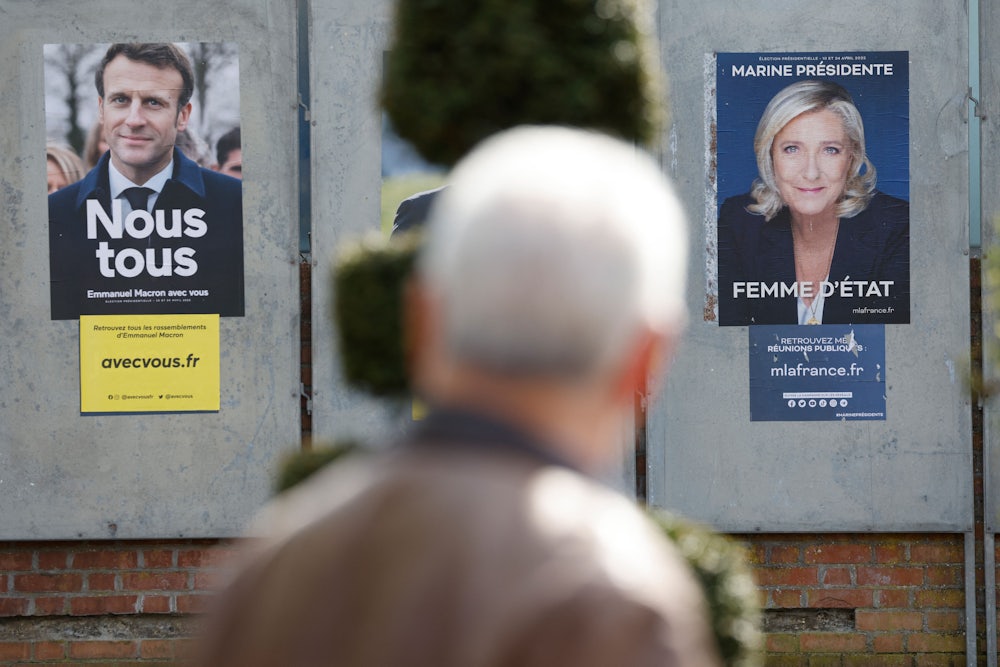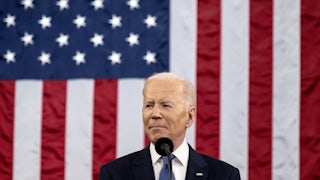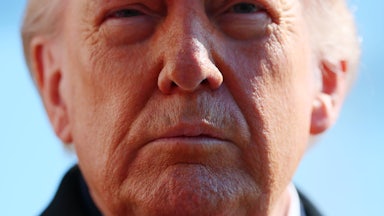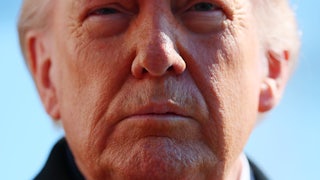The French went to the polls on Sunday to choose their next president. As predicted, turnout was low, with 26.3 percent abstaining (up nearly 4 percent since 2017). The incumbent, Emmanuel Macron, finished first, with 27.8 percent; followed by the leader of the far-right Rassemblement National, Marine Le Pen, with 23.1 percent; and the leader of the far-left France Insoumise, Jean-Luc Mélenchon, with just under 22 percent.
Although the final tally by and large confirmed preelection polls, that doesn’t mean that there were no surprises. First, all three leading candidates improved their scores compared to 2017: Macron, up nearly 4 points, gained the most, followed by Le Pen (up 2, despite new competition from Eric Zemmour to her right), and, most surprisingly, Mélenchon, whose 2.5-point gain put him closer to Le Pen than any of the polls had predicted. If he had been able to reach an agreement with the Communist Party, which supported him in 2017, he might have made the runoff, which would have transformed the race entirely. A second-round confrontation between Mélenchon and Macron would have focused attention on Macron’s failure to make good on the social aspect of his 2017 program rather than on the looming menace of the far right.
The second big surprise was the utter devastation of France’s historically dominant parties. Socialist Anne Hidalgo, the mayor of Paris, finished with a humiliating 1.75 percent, and Valérie Pécresse, the candidate of Les Républicains, descendants of the once-proud Gaullists, finished with a miserable 4.8. As a result, neither party will qualify for government reimbursement of its campaign debts, for which the bar is a minimum of 5 percent. The far-right firebrand Eric Zemmour did clear that bar with a 7 percent share. Zemmour may run for parliament in the June legislative elections, but he was quick to announce his support for Le Pen on election night (the only major candidate to endorse her, although she also garnered the approval of Nicolas Dupont-Aignan, who got 2 percent of the vote and who also backed her in 2017). All the other losing candidates announced either their support for Macron or—not quite the same thing—their staunch opposition to Le Pen. Thus, while the losing Gaullist Pécresse forthrightly announced that she would vote “in conscience” for Macron, Jean-Luc Mélenchon simply said, “We know for whom we will never vote! You must not give your vote to Madame Le Pen!”
This is significant, because what Mélenchon’s voters do will in all likelihood decide the outcome. An Ipsos poll carried out Sunday night showed that despite Mélenchon’s admonition, only 34 percent of his supporters plan to cast a ballot for Macron on April 24, while 30 percent will vote for Le Pen, and the rest either plan to abstain or haven’t yet made up their minds. The same poll suggests that Le Pen will get 85 percent of Zemmour’s vote, so Macron, despite his four-point lead, will need a better-than-even split on Mélenchon’s vote to avoid an upset.
As in 2017, there will be voices accusing Mélenchon of not doing enough to avert a Le Pen win. His repeated admonitions not to vote for Le Pen were obviously intended to foreclose this line of criticism: He made it clear that an outright endorsement of Macron was more than he was prepared to do. In her victory speech, Le Pen reached out to Mélenchon supporters. Throughout her campaign, she has emphasized the rising cost of living in France, particularly as a result of the war in Ukraine.
The other great unknown is whether turnout will increase for the second round and, if so, what will mobilize those who stayed home yesterday: a desire once again to bar the way to a victory of the far right, as in 2002, or a wish to punish Macron for creating what his bitter foes describe—more than a little hyperbolically—as “a neoliberal hell,” as one of them put it on Facebook this morning.
What horrors constitute this supposed “neoliberal hell”? In 2017, Macron ran as an unidentified political object, “neither right nor left.” Once in office, however, he enacted a series of measures, including labor-market reform, abolition of the wealth tax, reduction of some social benefits, and business-friendly corporate tax incentives, that can fairly be described as neoliberal. This entire program could have been enacted by the candidate of the center-right Les Républicains, and many on the left side of the political spectrum quickly turned on Macron, branding him “the president of the rich.” His offenses were compounded in the eyes of his adversaries by his readiness to crack down on certain Muslim religious schools suspected of being breeding grounds for Islamist radicals, and for the “anti-wokeist” rhetoric adopted by some in his administration, seen as a dog whistle to xenophobes and racists. By stealing the thunder of the center right, the argument goes, Macron deliberately strengthened the far right to bring about precisely the choice that now confronts voters, forcing even those who don’t like his policies to choose him as the lesser of two evils.
This argument is disingenuous. The Le Penist party has been a force in French politics for more than a generation. Its strength has waxed and waned over the years, but it has never disappeared. Treating it as a pariah party failed to eliminate it, and challenging it head-on only enhanced its status as the most vociferous opposition party—the party to vote for if one wanted to send the strongest possible message to whatever government was in power. A vote for the R.N. was also a “safe” protest vote, in the sense that, until now, it never really stood a chance of winning the presidency, so voters didn’t have to consider the consequences of actually putting a Le Pen in power. Macron exploited this constellation of political forces, but he did not create it.
Some critics also accuse Macron of being “anti-democratic” and “authoritarian” because of his top-down, technocratic style of governing, but one should note that the various steps he has taken to expand police powers, justified on “anti-terrorist” grounds, are still regarded as “insufficient” by a significant majority of the French. If Macron moved toward the position of the far right on these issues, it was in part because the public demanded it, particularly in the wake of the murder by beheading of the schoolteacher Samuel Paty in 2020.
Blaming Macron for the rise of the far right is convenient for many on the left, who do not wish to confront their own responsibility for the demise of France’s once-robust social democracy. On that score, these first-round results are mildly encouraging. Mélenchon nearly eclipsed Le Pen. Although he would like you to believe that his success was a consequence of his own virtues, it would be closer to the truth to say that it came in spite of his flaws. Mélenchon has an undeniable oratorical gift, even if his eloquence often reads like the antiquated anti-capitalist sermon of a nineteenth-century Marxist magically transplanted to the twenty-first century. His campaign trick of appearing in several cities at once via holographic teleportation is perhaps an indication that his presence is more like a ghostly visit from the past than a harbinger of the future. When Marx wrote that “a specter is haunting Europe—the specter of communism,” he of course had no idea that he would be describing the Mélenchon campaign’s high-tech legerdemain, but in fact he hit the nail on the head.
Mélenchon’s performance was remarkable, but what it represents is not a victory of his ideas but a hunger on the left for a viable alternative to both Macron’s centrism and Le Pen’s extremism. Many who voted for Mélenchon have no use for his broad-brush and hoary anti-capitalist nostrums. They do not want to replace capitalism but simply ask for a fairer distribution of its benefits. He gathered up the votes of people on the left, including some social democrats, along with his more radical base, who wanted their vote to count for something and who hoped to force Macron, the cleverest boy in the class, to debate with the verbally dexterous Mélenchon rather than the often clumsy Le Pen.
Thomas Piketty, writing on the eve of the vote, warned Macron that he need to make “a strong social gesture” if he wanted to avoid an upset. The economist pointed to the sleight of hand in one of the central elements in Macron’s 2022 platform: a proposal to raise the legal age of retirement to 65. Since full retirement benefits already require 43 years of remunerated work, this provision will change nothing for college graduates who begin work at 22, but for workers who enter the labor force on leaving high school at age 18, the measure would effectively increase the required working time to 47 years.
The perceived injustice of such reforms surely contributes to Le Pen’s popularity with France’s working class. In fairness, however, one should note that Macron’s proposal will undoubtedly face stiff opposition in the legislature and in the streets, and adjustment of the required working time for “long careers” is often used as a bargaining chip in haggling over the precise terms of pension reforms. A proposal that may have been a poor tactical choice for a presidential campaign season may reveal its merits when the real bargaining begins—but Macron first has to win the election.
In short, while the more strident voices on the left would have you believe that Macron strip-mined the center of the French political landscape, leaving only a slag heap on the far right and a barren, wind-swept mountain on the far left, the truth is that Macron has supplanted what used to be the center right, leaving a vacuum on the left, which for the time being has been filled by Mélenchon, faute de mieux. But Mélenchon’s relative success shows that there is a French left awaiting to be reconstituted. While the left may for now seem structurally inferior to the far right, there are also votes for a center-left candidate to be recovered from Macron’s plurality as well as from the scattered votes for Jadot, the Green candidate, Hidalgo, et al. The trick will be to find a candidate acceptable to Mélenchon’s hard-core base of 8–9 percent while still moderate enough to win back social democrats who have deserted to Macron. This will not be an easy circle to square.
Meanwhile, Macron still has to win the second round on April 24. Ipsos puts his chances at 54–46. Other polls have him winning as narrowly as 51–49. Of course, these numbers come with the usual caveats, so there is still reason to sweat. A Le Pen win would immediately plunge France and Europe into crisis. In the midst of the war in Ukraine, France would have a president who wants to withdraw France from NATO, who is hostile to the European Union, and who has called for France to have a foreign policy “equidistant from the United States and Russia.” She would face militant labor opposition and powerful, even violent, political protest. European stock markets would crash; French bond spreads would rise. The European single market would be threatened by the reinforced border controls that Le Pen promises to establish at every crossing. Donald Trump, Steve Bannon, and Vladimir Putin would rejoice; Olaf Scholz and Mario Draghi would shudder. It’s a sad commentary on the current state of the world and of France that such a catastrophe cannot be ruled out. But that is where things stand today.








